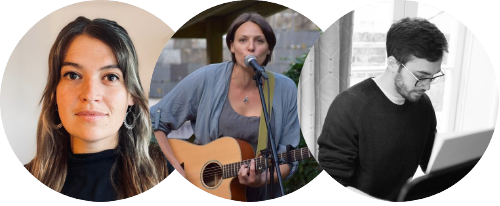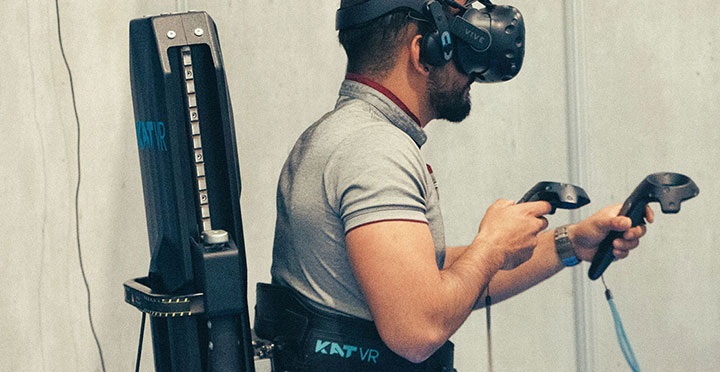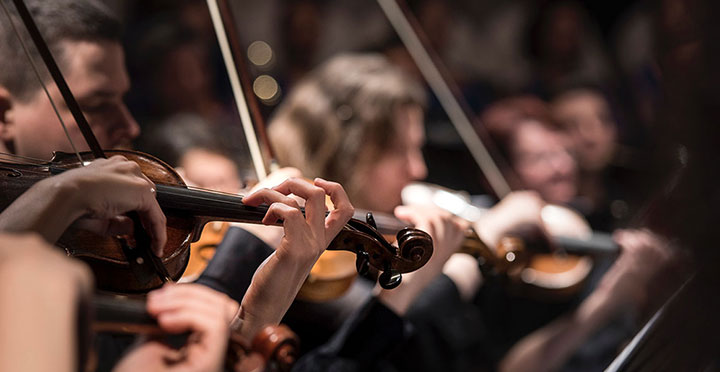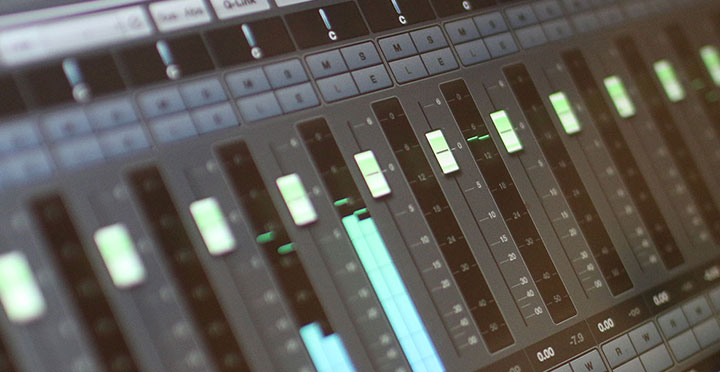TWO SUBJECT AREAS IN ONE DEGREE
MFA VIDEO GAME MUSIC & AUDIO
ONLINE Postgraduate Masters Degree
The games industry is one of the fastest expanding areas of media and with it comes unique opportunities for composers and sound designers. MFA Video Game Music and Audio will prepare you to enter the industry as both a video games composer and sound designer, complete with all the skills you need to create and implement fully interactive music and sound design using industry standard game engines and middleware.
During this comprehensive Master of Fine Arts degree course, you will cover the skills taught in both our MA Composing for Video Games and MA Sound Design for Video Games degree courses.
Preparing you for the career you deserve
This course covers every aspect of the video game music and audio world, exploring both linear and interactive music as well as sound design. It will prepare you for a career anywhere in the game audio industry, giving you the creative and technical skills from both a composer’s and sound designer’s perspective.
On this course, you will learn:
- The essential technical and creative skills required to compose music and create sound effects for video games in a fully interactive setting.
- How to compose for a wide variety of game genres, from mobile puzzle games through to action and racing games.
- To create and implement weapon, impact, and vehicle sounds.
- How to use inexpensive field recording equipment to produce atmospheres, spot-effects and Foley, as well as using sounds from commercial sound libraries.
- To use Wwise to implement your music and audio interactively in functional Unity games, many specially designed or licensed for the course.
- Collaborative, business, and remote working skills which are vital in such a connected global industry.
You will be taught and mentored by professionals currently working in the industry, ensuring you receive up-to-date knowledge and expertise. Between them, our tutors work for studios including Electronic Arts, Blizzard, Bandai, Nintendo, Capcom, Frontier and Dambusters. Below is a selection of the tutors on this course. You will learn from your tutors in live webinars, group music review sessions, personal one-to-one sessions, and through written feedback on your work. Plus there are regular guest lecturers from across the industry.
Guy michelmore
Composer & ThinkSpace CEO
Composed for Marvel, Disney, Lionsgate & Dreamworks
Giorgio Vezzini
Sound Designer & Audio Lead
Baldur's Gate 3
Batman: Arkham Knight
League of Legends
Sergio Roncchetti
Composer & Sound Designer
Eldest Souls
2021
Rail Route
Kevin Vail
Sound Designer & Engineer
Far Cry 5
Batman: Arkham City
Watchdogs
Jamie Christopherson
Games Composer
Fortnite
The Lord of the Rings: Battle of Middle Earth
Alyx Jones
Game Audio Professional
Silver Script Games
The Sound Architect
James Elsey
Video Game Composer
Evil Dead: The Game
Ross Tregenza
Helldivers 2
Gears of War
Team Sonic Racing
Michael Worth
Composer & Orchestrator
Rush Hour 3
Blood Brothers
Boxxi
Tomasz Kaczor
Sound Designer & Composer
Specialising in Animation, Films and Games
Jake Gaule
Composer & Sound Designer
Far Cry: Rise of the Revolution
Window
Idoz Games
Claire Fitch
Intel
Adobe
AMD
Course CONTRIBUTORS
Matt Lightbound
Sound & Audio Designer
Dead Island 2
Planet Coaster
Jurassic World Evolution
STEPHEN BAYSTED
Composer & Orchestrator
The Walking Dead: Assult
Project Cars
JOHN HARVEY
Sound Designer
Project Cars
Shameless
Ripper Street
SPencer bambrick
Composer & Electronic Artist
Nick Jr. Block Party
Evil Nun
Eternights
STafford bawler
Audio Director
Island Extreme Stunts
DiRT
Hungry Shark Shorts
ALEX GREEN
Sound Designer
Mark Angus
Alien: Isolation
Telling Lies
Harry Potter & The Deathly Hallows Part 2
NOA BEazley
Re:Awaken
A Token War
Phosfi
GINA ZDANOWICZ
Composer & Sound Designer
Paladins
Bioshock 2
Richard Wilkinson
Games Composer
Peaky Blinders: The King's Random
Narcos: Rise of the Cartels
Video game sound designers are expected to turn their hands to a variety of styles and genres. But over and above this, they are expected to create sound that explores the unique interactive nature of the medium. The non-linear medium of video games presents exceptional challenges and opportunities. Foundations of Game Audio examines these and starts to explore ways in which composers and sound designers respond. Students will explore this via professional based projects, the needs and demands of the industry, and learn new essential skills for future modules.
Students will be introduced to the concepts surrounding the purpose of game audio and the practical skill of creating audio in sync with a moving image. They will examine how it works in practice, technically, creatively and in the professional working environment. They will learn to create audio to a brief in a variety of styles, accurately interpreting the intentions of the game audio director.
They will explore the various roles within the game industry and learn who is responsible for each aspect of the game delivery. This module will also discuss game direction and management, storytelling and narrative, level design and game workflows. Specifically, the focus will be on handheld and mobile gaming.
In this module, you will:
- Learn the basic elements of working in games and the industry itself.
- Understand how to develop an original or distinctive voice as a composer through the creation of musical loops that transition seamlessly.
- Create, adapt, produce, mix and combine audio assets that support the game in the context of the brief, project, genre and/or industry.
We offer three different schedules so you can pick which best fits around your life. It is also possible to switch between these schedules at certain points during the degree, should you find that that you have more or less time available than you anticipated. You can also pause your degree altogether if life gets in the way.
Full-time – 24 months (approx 30 hrs/wk)
Part-time – 36 months (approx 20 hrs/wk)
Part-time – 48 months (approx 15 hrs/wk)
Please note that these weekly hours are estimates based on previous years' students. It will vary from student to student, depending on your rate of work. These time estimates include every element of the course: live workshops, one-to-one tutorials, reading and watching the course materials, and time spent on assignment projects.
FinancING
You will be invoiced in instalments at the start of each term. For courses lasting longer than 12 months, please budget for an annual inflation linked increase on the remaining balance of fees, based on UK RPI, capped at 8%.
Fees frozen until September 2026 intake
In response to current economic uncertainty, we've limited our fee increase to just the UK inflation rate (3.5%) to cover rising costs — and we’re committing to keeping fees at this level until the September 2026 intake. Worried about the financial or time commitment? Find out how we can help
STUDENT LOANS
In the UK you can apply for the following student loans to cover or contribute towards postgraduate tuition fee :
- Up to £12,858 in England. More info
- Up to £19,255 in Wales. More info
- Up to £6,500 in Northern Ireland. More info
- Up to £7,000 in Scotland. More info
PAY-AS-YOU-LEARN OPTIONS
We offer interest-free payment plans, where you can spread the cost of your course across the duration of your studies. The payment plan you are on depends on the schedule you are on. You will be required to pay a deposit upon enrolling.
ThinkSpace Masters degrees are validated and awarded by Arts University Bournemouth, and earn you the same number of academic credits as any other Masters degree in the UK or EU – 240 and 120 respectively (ECTS). While no official conversion exists, our degrees equate to approximately 48 credits in the US system, based on its criteria.
Unsure about studying online?
Concerned about feeling disconnected or lacking individual attention from home? Don't worry, our online music campus connects you with fellow students, industry alumni, tutors, and professionals across the globe. There's always someone to assist, offer advice, provide encouragement, or share work opportunities.
Discover what our degree alumni have to say about their connected experience with ThinkSpace, the friends they've made, and the networks they've built.
90%
of students rate the quality of teaching as good or excellent
Employment support programme
HELPING YOU SECURE YOUR FIRST ROLE
92%
of students say the regular one-to-one sessions are helpful and informative
accredited by Arts University Bournemouth
Your degree is accredited and awarded by our academic partner, Arts University Bournemouth (AUB). Home to the prestigious Bournemouth Film School – whose alumni include film director Edgar Wright (Baby Driver) and screenwriter Simon Beaufoy (Slumdog Millionaire) – AUB is a public university on the south coast of England. Its history dates back to the 1880s.
AUB provide academic oversight across our degrees, which are subject to the same rigorous quality checks as degrees taught by all UK universities.
How to apply
Simply fill out a short application form and provide a few examples of your music or sound design. We will get back to you with a decision within two weeks.
"Am I good enough?"
We are frequently asked this and are glad to help. You’ll need to be competent in your DAW and be able to write music fluently and productively. It doesn’t have to be orchestral music – as this course encourages all styles – and it doesn’t have to be perfect by any means. We are looking for potential. You also don't need a high level of music theory. We also don't expect you to be skilled at sound design when you start, but good audio editing and manipulation abilities are required.
We recommend booking a chat with one of our course advisors. As ThinkSpace Masters graduates themselves, then can take a listen to some of your work and let you know where you stand.
"A great opportunity, a great learning experience, and most of all, I really, really enjoyed doing all the work. The most valuable thing was the number of different games that you get to work on."
Rory Walker, Graduate
"I love that ThinkSpace only hires tutors that are actively working in the industry... It's really forward thinking"
REGISTER FOR MORE INFORMATION
Register below to receive further information by email, and get notified about upcoming online Open Days, events and deadlines.

We recommend booking an informal audio or video chat with one of our friendly course advisors. You can discuss your goals and time commitments, and learn about your different options for subjects, schedules and financing.
They can also review some examples of your music and let you know if you're ready for a Masters. If you're not quite there yet, they'll suggest some practical next steps.




